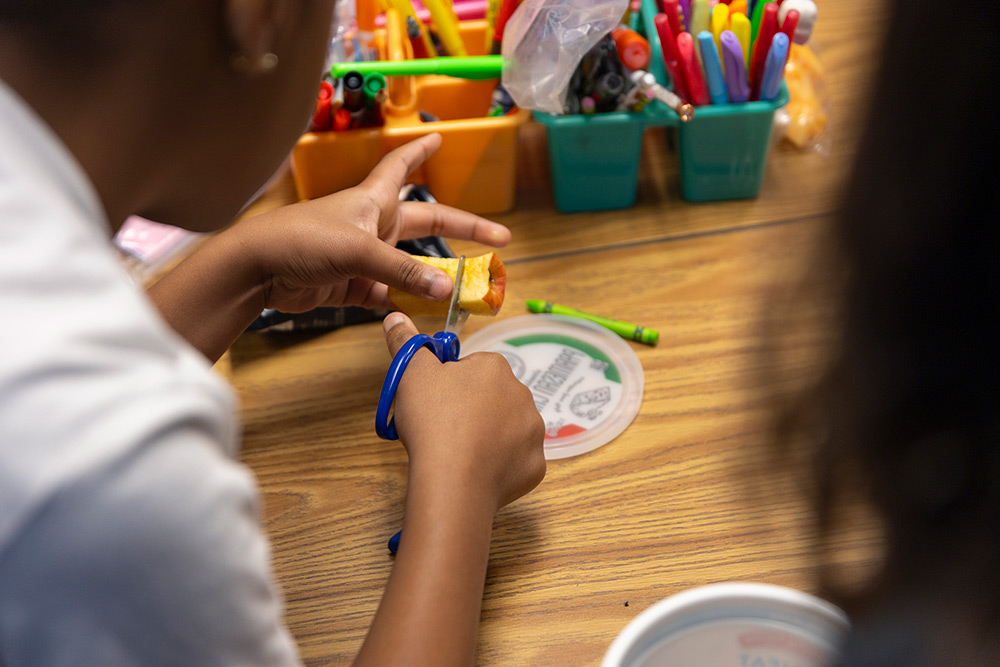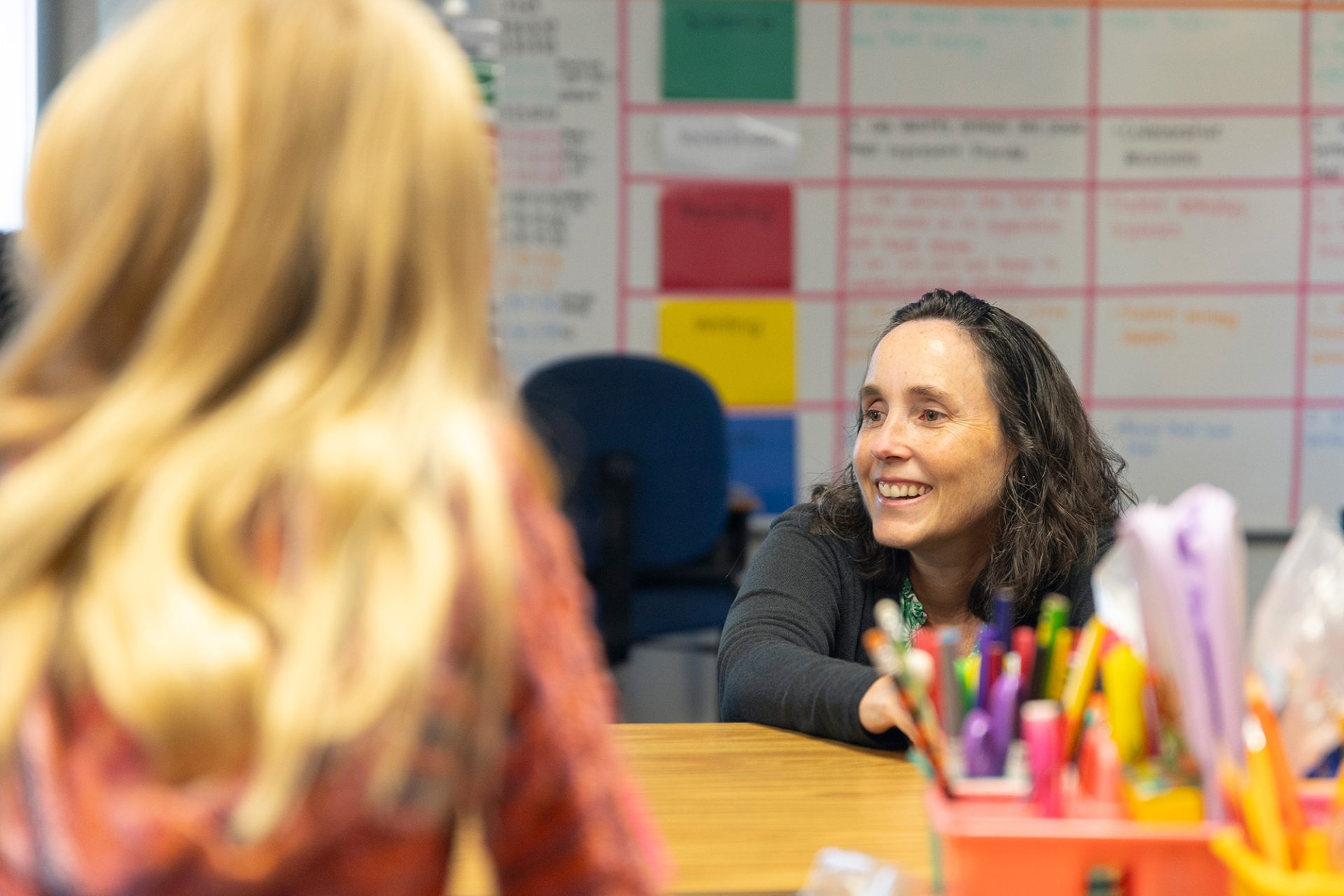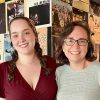The question was simple, the answer revealing.
“Who wants to help with an experiment that involves putting plastic into bowls of water and exposing it to sunlight?” A forest of little hands shot into the air. All 14 students in Heather Klein’s third grade class at Lakeview Fundamental Elementary School in St. Petersburg were responding to a question from Shannon Gowans, Ph.D., professor of marine science and biology at Eckerd College.
On a recent Thursday morning, Gowans and Amy Siuda, Ph.D., associate professor of marine science at Eckerd, met with Klein and her students to embark on a two-year project that will train more than two dozen Pinellas County teachers on the subject matter of plastic pollution, environmental impacts of these pollutants, and the pedagogy for teaching students in an experiential manner.
The work by the Eckerd professors is made possible through a nearly $100,000 grant from the National Oceanic and Atmospheric Administration. The grant period runs from August 2023 to August 2025.
The project is titled “Reduce Single-Use: Elementary Kids Turn Off the Tap for Marine Debris,” and Siuda and Gowans are collaborating with two teachers the first year—Klein at Lakeview Elementary and Elise Whittle at Midtown Academy in St. Petersburg. The second year, the team will train all second and third grade teachers from both schools—a total of 25 teachers—during a summer Professional Development Workshop on the Eckerd campus.
The goals, according to Siuda and Gowans, are for the students to: become familiar with the local watershed and the fisheries that depend on it, make connections between everyday activities and health of the watershed, increase their awareness of harmful effects of single-use plastics, explore alternatives to single-use plastics and ultimately reduce their use, recognize that individual actions make a difference, and increase their sense of stewardship for the environment through watershed protection.

A student in Heather Klein’s third grade glass at Lakeview Fundamental Elementary School cuts up a piece of apple core to use in an experiment on how certain elements, including plastics, break down in water.
Students will also take field trips to local waste management facilities and participate in cleanups on their school grounds, as well as at local waterways where they will quantify microplastics and macroplastics.
“We’re both biological oceanographers who’ve spent a lot of time analyzing the problem of marine debris, starting with microplastics in Tampa Bay,” says Gowans. “We can study all we want,” Siuda adds, “but we can’t do a thing about it unless we can change our behavior. Initially we focused our efforts in the Eckerd community, then we realized younger students could also help to tackle this environmental challenge.”
The 7- and 8-year-olds were chosen, Gowans says, “because they were old enough to have had some experience with how plastics are used, they’re able to use critical thinking, and they’re not hardwired into everything.” Another advantage is that one of Gowans’s daughters is in Klein’s class, and Siuda’s daughter attends Midtown Academy. “So we could see ways we could incorporate information into the existing curriculum,” Gowans explains, “and then in the summer workshop, we’ll find ways to incorporate lessons throughout different disciplines.”
Siuda and Gowans say they hope to have a class project where, for instance, the students create a permanent classroom collection of reusable items that can be “checked out” at snack time. They also may encourage students to write a letter or make a presentation to the Pinellas County School Board or the St. Petersburg City Council to gain their support.
And they hope for more funding—enough to take the project to every public school in Pinellas County. They have already made an impression at NOAA.
Amy Clark, Gulf of Mexico Bay Watershed Education and Training program coordinator for the Southeast Regional Office of NOAA Fisheries, says the project Siuda and Gowans put together “is meritorious because it focuses on hands-on environmental education for young students in schools with diverse populations, an audience which sometimes lacks access to experience science education.
“A strength of the project,” she says, “is its focus on single-use plastics and plastic pollution, a large and growing problem in the environment and watershed. Additionally, the experiences students will participate in will be meaningful and will help to illustrate the issue.”
One unique aspect of the project, Clark adds, is its reach across disciplines. “The environmental lessons and activities will be incorporated into the curriculum throughout the school year across science, math, ELA, social studies, art, music and gifted areas. This is fantastic for reinforcing concepts via various learning styles and interests and for sustaining the program.”
After Siuda and Gowans finished their lesson at Lakeview Elementary, Klein says her main takeaway “was that the students were really interested and engaged. It was very successful. With kids, it’s getting that buy-in and a connection to the real world.
“This is the ideal age because students are so excited about learning, and they like going home and talking about it with their families. That’s where we can hopefully make a difference. It’s starting a conversation and asking questions.”
Eckerd College has been at the forefront of the effort to educate its students and the public about single-use plastic. Within the past four years, Siuda and Gowans have been awarded two grants from the NOAA Marine Debris Program to reduce single-use plastic consumption on campus. In 2022, Eckerd reaffirmed its commitment to eliminate the purchase of nonessential single-use plastics using College funds, the first of its kind to be enacted in the nation.
And last spring, Gowans, Siuda and their students, with funding from the EPA Trash Free Waters program, launched Remora, a digital application that asks users to track each time they use and refuse plastic items such as straws, bags and cups.













